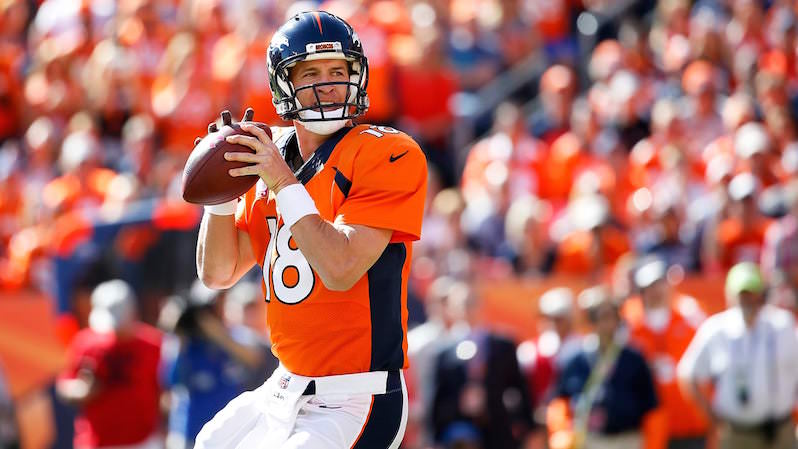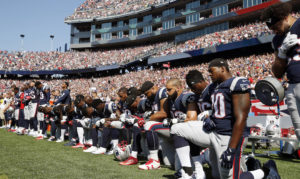Adieu to Peyton Manning—and His Squeaky-Clean Image
The NFL star has received millions in endorsements, largely because of his reputation as the All-American boy next door. But as he retires, he is being chased by accusations that he exposed himself to a woman in 1996 and that he used a banned substance after a 2011 surgery. Vimeo
Vimeo
We are not only saying goodbye to Peyton Manning. When the star quarterback announced his retirement Monday after 18 years in the National Football League, we also bid farewell to the notion of the All-American boy next door that he seemed to represent.
As many commentators have already noted, it appeared to be a perfect scenario: Manning riding off into the sunset after helping the Denver Broncos defeat the Carolina Panthers in Super Bowl 50 last month, ending his football career after his second Super Bowl victory—similar to what former NFL star and current Broncos general manager John Elway did in 1998.
“You changed the game forever and made everyone around you better,” New England Patriots quarterback Tom Brady wrote to Manning on Facebook. “It’s been an honor.”
But all was far from perfect. Manning looked like a man getting out of Dodge, or Denver, one step ahead of the posse. Controversies surrounding his departure reflected a cultural clash between today and the era in which Elway played.
Against Manning’s good name stand two allegations—exposing his genitals to a woman when he was a University of Tennessee sophomore in 1996 and of using HGH (human growth hormone, banned by the NFL) following neck surgery in 2011.
Manning was accused of turning his genitals into the face of trainer Jamie Naughright, who reported the incident, eventually lost her job, and would later file lawsuits related to the incident. Manning claimed he had been mooning a cross-country runner who was present, a man who later said Manning’s account was not true.
On Tuesday, the day after he retired, Manning said, “I did not do what has been alleged and I am not interested in relitigating something that happened when I was 19 years old.”
The HGH allegation, which the NFL is still investigating, involves a shipment to Manning’s wife, Ashley. It violates one of sports’ worst taboos, although attitudes are softening even among baseball fans, hardest of the hardcore worshippers of rules and numbers. Retired catcher Mike Piazza went into the Hall of Fame with little mention of his startling weight gain when he was a player.
After he won acclaim on the football field, Manning was marketed as the squeaky-clean All-American boy that corporations need to sell their products.
He seemed to be at the middle of the mainstream, making him appear to many (including me) to be boring, white bread and even a sellout for taking the $12 million in endorsements that he received annually from Nationwide Insurance, Buick, DirecTV, Papa John’s and other brands.
Even if neither Manning nor his sponsors said he was a demigod, the real role of spectator sport in our society is to provide the illusion that there are heroes standing high above the demonstrably fallible figures we see in other areas of our lives—in politics, for example, particularly during this presidential campaign season.
Had Manning retired before the rise of social media, the allegations of sexual harassment and illegal substance use would probably have been overlooked. But the coming of the social media era, which began soon after the Tennessee accusation was first heavily reported, changed everything. Facebook launched in 2004, YouTube in 2005 and Twitter in 2006.
It was a newspaper, USA Today, that broke the Tennessee allegation in 2003, with columnist Christine Brennan writing a follow-up piece two days afterward headlined “Do you really know your sports heroes?”
The story slipped out of public consciousness and stayed there until the New York Daily News’ Shaun King, after writing a Facebook post about Manning and Carolina Panthers quarterback Cam Newton following the Broncos’ Super Bowl victory, got a reader reply citing the Tennessee allegations.
King searched the phrase “Peyton Manning sexual assault University of Tennessee” on the Internet, came up with the USA Today story, got a lawsuit transcript and publicized the story anew.
It’s not that today’s sports stars are getting a bad deal. (If you can’t do the time, don’t do the crime.) But alas, many have become less heroic as the certainty has grown that they will be found out if they commit misdeeds — e.g., bar fights captured in cellphone videos. (For what it’s worth, up close Manning comes off as a really nice guy. One major magazine writer told me Manning was the most engaging subject he ever interviewed.)
Holy visibility, Batman! Within hours of Manning’s Monday news conference, Brock Osweiler, Manning’s highly touted Broncos backup, was caught on video pushing a woman outside a pizzeria in Scottsdale, Ariz. Local police took no action, with a spokesman dismissing the incident as a “downtown Scottsdale scuffle.”
We can expect ever greater falls from grace, a parade of tawdry behavior that registers as betrayal among an audience that is ever more disillusioned, ever angrier about it—but also hopeful about tomorrow. Fans remain eager for demigods, and corporations remain eager to feed them some.
“It’s life and life only,” Bob Dylan once wrote. Now there’s just so much more of it.
Your support matters…Independent journalism is under threat and overshadowed by heavily funded mainstream media.
You can help level the playing field. Become a member.
Your tax-deductible contribution keeps us digging beneath the headlines to give you thought-provoking, investigative reporting and analysis that unearths what's really happening- without compromise.
Give today to support our courageous, independent journalists.







You need to be a supporter to comment.
There are currently no responses to this article.
Be the first to respond.